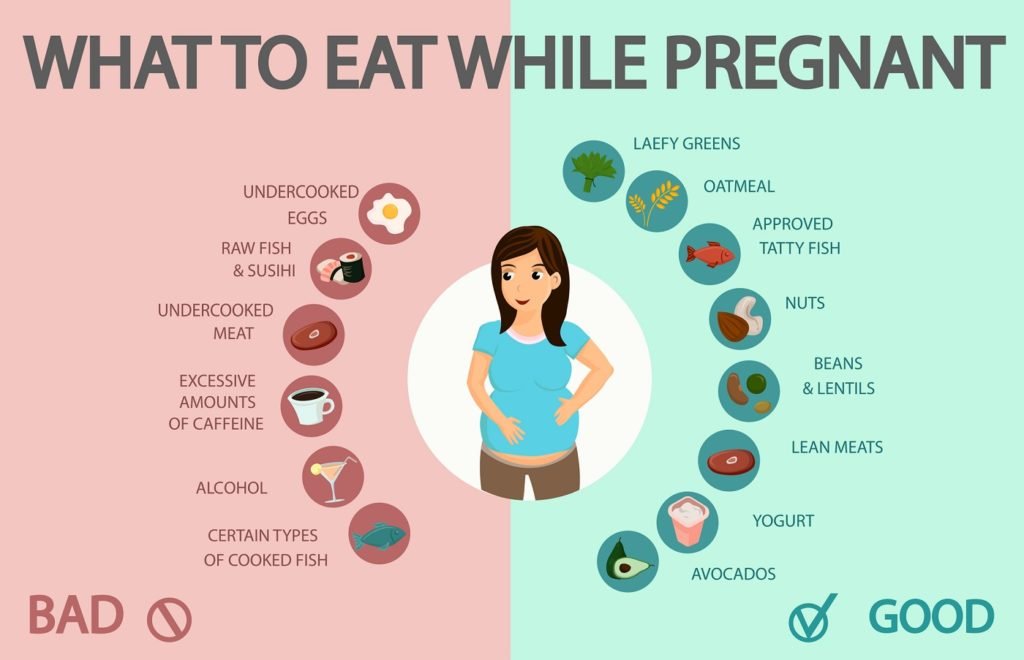Maintaining a healthy diet during pregnancy is crucial for the well-being of both the mother and the baby. Proper nutrition supports fetal development, helps manage pregnancy symptoms, and prepares the body for childbirth and breastfeeding.

1. Leafy Greens
- Examples: Spinach, kale, Swiss chard, and collard greens.
- Nutrients: High in folate (important for fetal brain and spine development), iron (helps prevent anemia), calcium (supports bone health), and fiber (aids digestion).
- Why They’re Good: Folate is essential in early pregnancy to prevent neural tube defects, and leafy greens provide a wide range of essential vitamins and minerals.
2. Whole Grains
- Examples: Brown rice, oats, quinoa, whole-wheat bread, whole-grain pasta.
- Nutrients: Rich in fiber, iron, B vitamins (especially B6), and magnesium.
- Why They’re Good: Whole grains help maintain blood sugar levels, provide sustained energy, and are beneficial for digestive health.
3. Lean Proteins
- Examples: Chicken, turkey, lean beef, tofu, legumes, eggs, fish (low-mercury).
- Nutrients: High in protein, which is crucial for tissue growth, and also provides essential amino acids.
- Why They’re Good: Protein is essential for the development of the baby’s organs, muscles, and tissues. Fish (like salmon) also provides omega-3 fatty acids, which are important for brain development.
4. Dairy Products
- Examples: Milk, yogurt, cheese.
- Nutrients: High in calcium, vitamin D, and protein.
- Why They’re Good: Calcium supports the development of the baby’s bones and teeth. Dairy products also provide vitamin D, which helps with calcium absorption.
5. Nuts and Seeds
- Examples: Almonds, walnuts, chia seeds, flaxseeds, sunflower seeds.
- Nutrients: Rich in healthy fats, protein, fiber, and essential minerals like magnesium and zinc.
- Why They’re Good: Healthy fats are crucial for the baby’s brain development, and magnesium helps with muscle and nerve function.
6. Berries
- Examples: Strawberries, blueberries, raspberries, and blackberries.
- Nutrients: High in vitamin C, fiber, and antioxidants.
- Why They’re Good: Vitamin C helps boost the immune system and promotes the absorption of iron from plant-based sources. Antioxidants protect both mother and baby from oxidative stress.
7. Sweet Potatoes
- Nutrients: Rich in beta-carotene (vitamin A), fiber, and potassium.
- Why They’re Good: Vitamin A is essential for the baby’s growth, particularly for the development of the eyes and skin. Sweet potatoes also help with digestion due to their high fiber content.
8. Legumes
- Examples: Lentils, chickpeas, black beans, kidney beans.
- Nutrients: Packed with protein, fiber, iron, and folate.
- Why They’re Good: Folate helps prevent neural tube defects, while protein and fiber support overall growth and digestion.
9. Avocados
- Nutrients: High in healthy fats (monounsaturated fats), folate, vitamin C, and potassium.
- Why They’re Good: The healthy fats in avocados are important for the baby’s brain development, and they also help with the absorption of fat-soluble vitamins.
10. Citrus Fruits
- Examples: Oranges, lemons, grapefruits, mandarins.
- Nutrients: High in vitamin C, folate, and fiber.
- Why They’re Good: Vitamin C boosts immunity and supports the absorption of iron, while folate is essential for fetal development.
11. Carrots
- Nutrients: High in beta-carotene (vitamin A), fiber, and potassium.
- Why They’re Good: Vitamin A supports the baby’s eye development and immune system, while fiber helps with digestion and preventing constipation.
12. Fish (Low-Mercury)
- Examples: Salmon, sardines, trout, herring, and mackerel.
- Nutrients: High in omega-3 fatty acids, protein, and vitamin D.
- Why They’re Good: Omega-3 fatty acids support the development of the baby’s brain and eyes. Fish is also a good source of lean protein.
13. Water and Hydration
- Importance: Staying hydrated is essential during pregnancy for maintaining amniotic fluid levels, digestion, and preventing fatigue and swelling.
- Why It’s Good: Dehydration can lead to complications such as premature labor, constipation, and urinary tract infections.
14. Eggs
- Nutrients: High in protein, choline, vitamin D, and vitamin B12.
- Why They’re Good: Choline is critical for brain and spinal cord development, and eggs are a great source of complete protein.
15. Iron-Rich Foods
- Examples: Red meat, poultry, tofu, spinach, fortified cereals, beans, and lentils.
- Nutrients: Iron is important for preventing anemia and helping the baby’s blood cells develop.
- Why It’s Good: Iron helps transport oxygen to the baby and prevents fatigue and weakness in the mother.
Foods to Avoid During Pregnancy:
- Raw or Undercooked Seafood, Meat, and Eggs: To avoid foodborne illnesses such as listeria and salmonella.
- Unpasteurized Dairy Products: These may contain harmful bacteria.
- High-Mercury Fish: Avoid fish like shark, swordfish, king mackerel, and tilefish.
- Caffeine: Limit to moderate amounts to avoid potential risks like low birth weight or premature birth.
- Processed Junk Foods: These are often high in unhealthy fats, added sugars, and sodium.
General Tips for Pregnancy Nutrition:
- Eat Small, Frequent Meals: Helps keep your energy levels steady and manage nausea or heartburn.
- Take Prenatal Vitamins: Ensure you’re getting enough folic acid, iron, and other key nutrients.
- Consult Your Doctor or Dietitian: They can provide tailored advice for your individual health needs during pregnancy.
